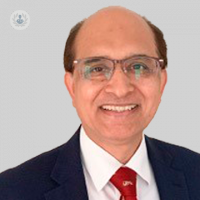Carotid endarterectomy for prevention and management of stroke
Written by:Did you know that stoke is the largest cause of neurological disability and the third commonest cause of death, after cancer and coronary disease? Each year in the UK over 100,000 people have a stroke. Approximately a half of these are due to a narrowing of the carotid arteries.

We recently spoke to the leading carotid surgeon and highly-experienced consultant vascular surgeon, Mr Muhammad Asad Rahi , about how carotid endarterectomy can help prevent strokes. Mr Rahi let us know what surgical techniques are used to carry out this procedure, what the benefits and the risks are.
What is carotid endarterectomy?
Carotid endarterectomy is the surgical management for the prevention of stroke and can be carried out under local anaesthesia.
Carotid endarterectomy is a surgical procedure that gets rid of the build-up of fatty deposits which cause narrowing of a carotid artery. The carotid arteries are the main blood vessels that supply the neck and head. (blood flow to the brain is mainly through the internal carotid arteries)
Carotid endarterectomies are usually carried out when one or both of internal carotid arteries become narrowed because of a build-up of fatty deposits.
This is known as carotid artery stenosis or carotid artery disease.
What are the benefits of having a carotid endarterectomy?
Ultimately, the goal of carotid endarterectomy is to prevent the patient from having a stroke. When blood flow to the brain is blocked, the result can be a transient ischemic attack (TIA), which temporarily affects brain function, or a stroke, which is permanent loss of brain function.
Symptoms of a stroke can include:
• weakness in the face
• weakness or numbness in the arm or leg, especially on one side of the body
• difficulty in talking or understanding speech
• trouble seeing in one or both eyes.
It can also cause confusion, difficulty with walking, loss of balance and coordination.
Carotid endarterectomy reduces the overall risk of fatal and non-fatal ipsilateral carotid stroke.
When is a carotid endarterectomy recommended?
Surgery is usually recommended because the narrowing of the carotid artery responsible for your TIA is already significant. Usually, the operation will be performed if the narrowing is more than 50%. Your risk of stroke varies according to your symptoms and scan results.
What are some of the complications of carotid endarterectomy?
There is a 3-5% risk of perioperative stroke and death from urgent carotid endarterectomy. The risk of morbidity is nearly 10%, including damage to cranial nerves, vagus, hypoglossal, recurrent laryngeal, glossopharyngeal and superficial branches of the facial nerve. There is a small risk of infection, bleeding and myocardial infarction.
What surgical techniques are used to carry out a carotid endarterectomy?
There are two commonly used techniques for carotid endarterectomy (CEA). Standard CEA technique involves longitudinal arteriotomy with patch closure and is common. Eversion CEA requires complete division of internal carotid artery from common carotid artery and has shorter clamp time as a patch is not required.
The principles of safe surgical technique include: careful positioning of the patient to avoid excessive extension of neck, minimal handling of carotid arteries to reduce the risk of embolism, use of intravenous heparin before early clamping of internal carotid artery, careful flushing of debris and air with heparinised saline, continuous back bleeding of ICA during final closure of the arteriotomy, initial reperfusion of the external carotid artery and final assessment of waveforms with Doppler probe or Duplex scan.
What is safer Standard CEA or Eversion CEA?
Both techniques are safe and efficacious with no significant difference for the main outcome measures of stroke and death. It is confirmed on the systemic review of randomised trials of Eversion CEA verses Standard CEA, the largest trial was the EVEREST trial. Follow-up of patients showed that late restenosis or occlusion may be less frequent with Eversion CEA but ipsilateral stroke is less common with Standard CEA.
For more information on surgery for the prevention of stroke, we recommend booking an appointment with a leading consultant vascular surgeon such as Mr Muhammad Asad Rahi . Click here to visit his Top Doctors profile today for information on appointment availability.


